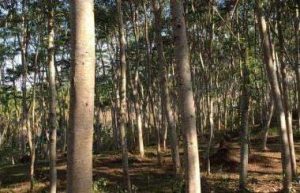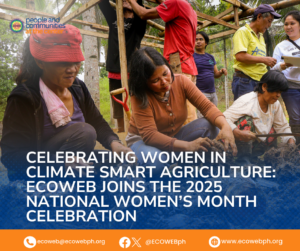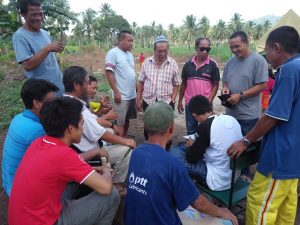ECOWEB has been pursuing social enterprise as a development strategy. This is done for the past ten years to alleviate poverty. The organization has discovered that government support for mission-driven enterprises is limited, despite the fact that social enterprises have played an important role in poverty alleviation and economic democratization.
Through this reason, ECOWEB has transformed its efforts and heightened its programs specifically for social enterprise not just for mainstreaming but to support indigenous peoples who are well-driven to become more motivated in farming and agriculture, and lead their way to become social entrepreneurs.
In terms of profit generation and social service provision, ECOWEB focused on educating indigenous farmers especially in the highlands of Iligan City and introducing an opportunity for abaca growers to improve fiber quality and generate income for their families. Thus, this is an advantage for indigenous farmers to advance their processing and honor them to start their entrepreneurship journey.
ECOWEB has concentrated its social enterprise efforts on increasing farm production by forming self-help groups (SHGs) that will collaborate on each other’s farms. The goal is to make it easier for farms to expand and maintain themselves.
For the following, ECOWEB wanted to share stories of abaca farmers and how this IP community has engaged, involved, and became more aware of their capacity to become agents of their own change.
Transformation of abaca farmers to social entrepreneurs
Economic expansion somehow entails a rising labor force. Farming can also be a source of income and capital for industrial development. Additionally, farmers in the IP community also see their farms as their source to earn for their daily consumption. They are dedicated to sustain their farms and willing to take calculated risks in order to make their farms develop and at the same time – profitable. This is a basic concept wherein farmers are their own entrepreneurs, however, working in a challenging and changing environment.
ECOWEB assists IP farmers who are commonly abaca growers through the Formation of Production Guild and Social Enterprises for Economic Development of Indigenous Communities (FPG-SEEDIC) initiative, which is funded by Bread for the World, a German development organization.
This project transforms farmers into entrepreneurs by developing their knowledge on proper farming to harvesting. The intervention of the project was realized by the farmers as a means to appreciation and utilization of their local crops especially abaca.
Introducing them to social enterprise is a huge influence to their economic development. For the earlier months of project operation in Iligan-Bayug, social enterprises were recognized and established.
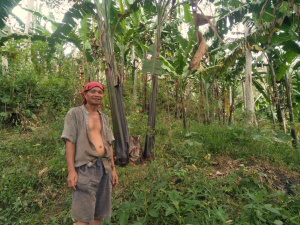 Daaca Manabilang from Sitio Binasan, Rogongon, Iligan City, a 54-year-old farmer and a father of four, became an inspiration to the entire community.
Daaca Manabilang from Sitio Binasan, Rogongon, Iligan City, a 54-year-old farmer and a father of four, became an inspiration to the entire community.
He started planting abaca back in 2013 under the support of ECOWEB. The development and sustainability of his farm were purely by his own initiatives.
From the reference point of having 1 hectare of abaca farm before, he is now managing a 5-hectare expansion with approximately 5,000 existing abaca hills.
With it, Daaca is one of the well-known abaca traders in the entirety of Rogongon. With an average production of 2,000 kilograms of abaca fiber which he delivers to EcoSSol, a registered for-profit corporation owned by ECOWEB, he earns 30,000 pesos a month.
As he started engaging himself to abaca social enterprise, his son graduated college because of it and he have bought five motorcycles that he uses for transporting fibers – which made him being looked up by other farmers.
Jay Ar Dalahay Saballa, a young farmer, said that it is more than Daaca’s material possession that he admires about. “His passion to farming attracts prosperities. Daaca became a role model to farmers.” he added.
“Some people think that abaca is just a simple plant. They do not value abaca. What they do not know is that it will help a lot in their lives. If only they could ponder the worth of farming, they will ascend high. It only requires courage and passion. The time I started to produce fiber and sell it by my own effort, I realized that blessings are already there, you just have to work hard for it.” said Daaca as he expressed his personal perception on how to earn money out of Abaca.
 The impact of the social enterprise to farmers can also be observed to Barty Egbao, Migasaboa Abaca Farmers Association President.
The impact of the social enterprise to farmers can also be observed to Barty Egbao, Migasaboa Abaca Farmers Association President.
The project has established cluster-based buying stations in Rogongon and one of those is Indigenous People’s Migsaboa Marketing Cooperative with 200 active members that is presided by a general assembly.
This buying station is an abaca farmer-driven. ECOWEB provided adequate intervention to improving and sustaining farmers’ skills on gender-sensitive social enterprise management and sustainability. The total operation of this cluster-level buying station as situated in community-level is carried out by abaca farmers.
“Because at first, all I thought about was how to harvest and when to harvest. I never thought abaca would make a lot of money. I also do not know that as a farmer I am actually an entrepreneur. When we were taught by ECOWEB to work together, there I realized that our farming activity could have grown even more. Not just one person was helped by the social enterprise, it has helped our community” Barty expresses the impact of the project to their community. He added that there are other people in the community who sell Abaca fiber to them from Tawagon and other areas.
“With the full technical support of ECOWEB, farmers now are now gaining just and fair price of abaca product such as fiber. We have felt how our income increased out of abaca and because of knowledge and skills acquired from ECOWEB.” added by Rudy Bindanillo, one of the farmers who as he expressed his sentiments due to the observable financial development to his family.
Maximization of local crop, abaca as a mean to development
One of the goals of the project is to increase the income of abaca farmers. Farming is the main livelihood in Rogongon. Proper farming practice is very important in increasing production because the volume and quality of an abaca depends from it.
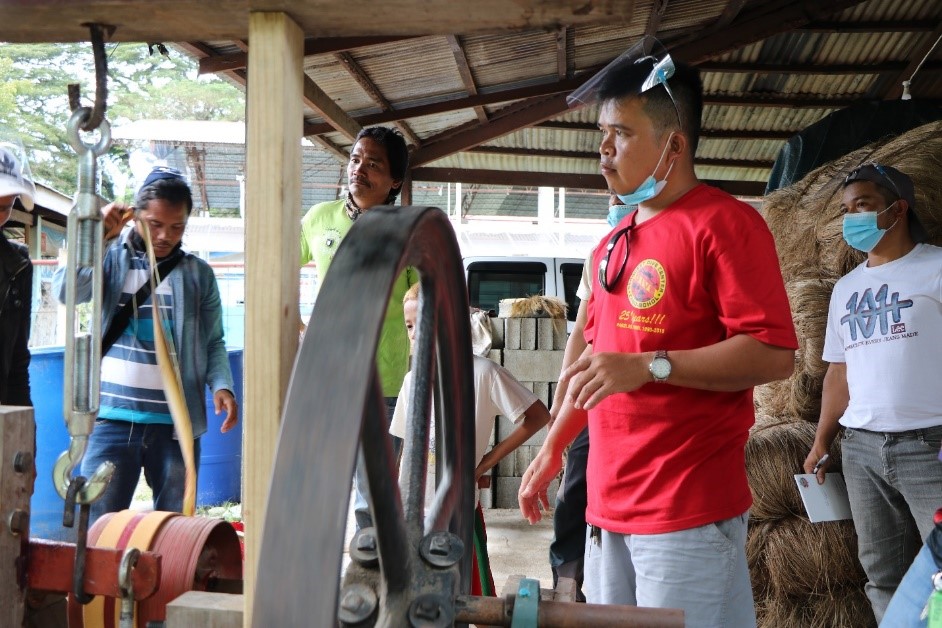
Farmers were taught the correct method of planting and harvesting. Farmers’ habitual farming practice has been corrected. One of these farmers is Melvin Samohan.
Melvin started planting Abaca back 2008. His farming methods have changed since he received trainings from the organization. He realized that the process of planting and harvesting that they undergone was erroneous but he did not despair as he knew it could be improved.
This is one of the things he is grateful for to ECOWEB. “Plants are like human being. It needs proper care and management. They get sick due to improper management and it can affect your source of income” said Melvin as he appreciates the importance of proper management to agriculture.
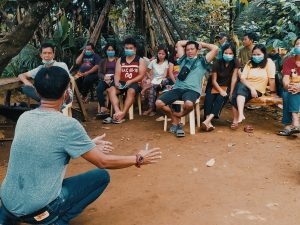 The dominant abaca agricultural system is still mostly subsistence-oriented. Farmers require support in order to expand and improve their agricultural system. Traders take advantage of them by buying their product at a low price based on the claim that their abaca fiber is of poor quality. Farmers are unaware of the usual procedure for producing high-quality fiber.
The dominant abaca agricultural system is still mostly subsistence-oriented. Farmers require support in order to expand and improve their agricultural system. Traders take advantage of them by buying their product at a low price based on the claim that their abaca fiber is of poor quality. Farmers are unaware of the usual procedure for producing high-quality fiber.
But these farmers are striving to make abaca as a means of financial sustainability and farm development. They can accomplish so much more with their strong cooperation and participation. They will be able to improve their social status in the stratum and continue what they have begun. Despite all of the obstacles they faced along the way, their determination won and the community’s genuine efforts draw them in to become more motivated.
Organic fertilizer in sustainability and productive farming
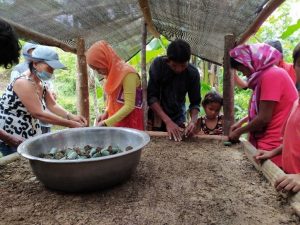 Organic farming is referred to the production methods that do not use artificial pesticides, chemical fertilizers, or genetically modified organisms.
Organic farming is referred to the production methods that do not use artificial pesticides, chemical fertilizers, or genetically modified organisms.
Long time ago, Deodato Abungan of Bayanohan, Rogongon said that their ancestors were real practitioners of organic farming not until commercial pesticides were introduced.
Many years passed by that organic farming had been forgotten. He admitted that he has been using chemical pesticides due to urgent need for money to support his family. Later did he realize that little by little, his land was gradually being destroyed. With the help of the project, it did not worsen.
As ECOWEB advocates for organic farming, many trainings including organic fertilizer production were conducted to abaca farmers and Amor D. Ramos, women’s organization president, is one of the beneficiaries. These skills and knowledge were turned into actions which led to the progress of their farm.
The good variation and progress by this intervention were felt by farmers of Limunsudan. Amor said that he started using organic fertilizer inhis vegetable garden and he saw that the fruit, thereof, was good.
“I used the processes, strategies I learned from ECOWEB and used the organic fertilizer to my abaca farm. It did so well. Aside from it (OHN) helped to kill insects, there is one that I realize more – I do not have to buy fertilizers anymore. I have saved money that I could use for other things such as medicines. It is easy to make fertilizer because the ingredients can be found outside our house. In our house, my wife makes organic fertilizers.” he added.
Vegetable gardening nurtures seeds of creativity
 Food Always in The Home (FAITH) Gardening is a community-driven agricultural activity that targeted to link the need of food of farmers in times of pandemic.
Food Always in The Home (FAITH) Gardening is a community-driven agricultural activity that targeted to link the need of food of farmers in times of pandemic.
By means, these vegetable gardens become their source of foods while waiting for abaca production as their primary source of income. FAITH Gardening aims to edify farmers about the rudiments of gardening by its basic concept, which allows them to utilize the knowledge and skill for the hands-on horticultural.
There are cultivatable home-based vegetable backyards and communal backyard established by the creativity of farmers and women. Currently, there is an estimated 2.39 total hectares of vegetable garden with the seeds distributed by the project such as bitter gourd, squash, tomato, cucumber, pechay, string beans and okra.
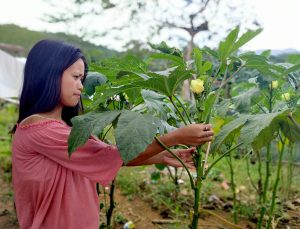 Taking fresh, safe, and beneficial food that strengthens a person’s immune system is one of the best ways to protect one’s self from COVID-19.
Taking fresh, safe, and beneficial food that strengthens a person’s immune system is one of the best ways to protect one’s self from COVID-19.
Nolisa Mahilum said that the vegetable garden is absolutely vital for the environment and they are a matter of survival to some. She added that by “having a healthy ecosystem full of pollinating insects is where our food supplies depend from and I treat my vegetable garden like an extension of my house, a room to be decorated properly”.
Backyard gardens are relatively small areas around homes people use to grow food for them and their families.
Madie Diacat, a 66-year-old from Purok Lindab of Rogongon, said that vegetable gardening has been going on for ages but this practice is declining in some places especially in some urban areas for obvious reasons.
“Most of the time people think that food can always be obtained from the open marketplace. But why waste time and effort, when they can grow their own in a garden.” he said.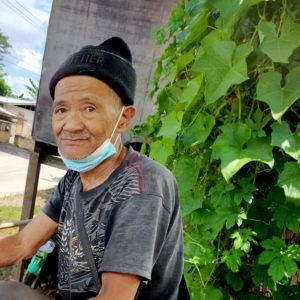
Madie is consistent that their vegetable garden became a food source. This is the reason why vegetable garden draws attention to farmers when community quarantine and lockdowns were imposed. One of the reasons it sustained is because of the proper management and a farmers’ behavior.
Meanwhile, as ECOWEB envisions families to be self-sustaining component of a community, it imparts farmers including women the ways they can sustain their foods while taking advantage on their backyard land.
Hermocilla Soong, from Rogongon, together with her husband Esteemer Soong have earned a total of 4,000 pesos from May 2021 to June 2021 from selling crops from her vegetable garden that compromises of bitter gourd, cucumber, tomato and others. At that time, the revenue was fair enough to pay for Hermocilla’s daily needs. Even more, she is also saving money for her children future and for their medicine.
Women as a big part of the success
Farming, to some, is understood as men with carabaos on corn and rice fields, harvesting crops, stripping tuxy, hauling dried fiber on their back. Less often, women who maintains cleanliness of farms, planting seedlings, weighing hundreds of tuxies each harvest time and carefully classify those afterwards are left unrecognized.
Women’s effort has historically been underrated. One of ways to changing it is to know that women are actually part of the society. They must have equal participation as men and they must not be discriminated.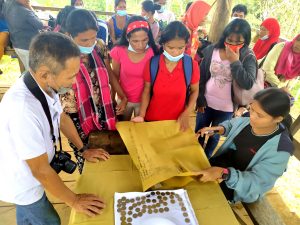
Agriculture is seen as both man’s and woman’s profession in Mainit. Particularly abaca farming. As a matter of fact, women have strong contribution to agriculture however, there is a need to show their contributions and discuss issues from their perspective. On the other hand, women’s contribution is so perceptible in Rogongon.
Amelyn Macan Liloan, women’s organization president, said that she helps in farming to show her children that farming is also a work of women. She said that she wanted to be a role model to her children.
ECOWEB has been hovering in from barangay to barangay of Bayug-Iligan with firsthand knowledge of women farmers as a result of numerous community immersions to these different barangays. ECOWEB delivered legal and technical support to women and men farmers and leading to this support are the gender and child sensitive trainings it holds to take in women farmers to societal planning, decision-making processes and to farming in general.
The inclusion of women to decision-making contributed to a balance and fair plot of an association towards development.
As a conclusion, farmers in the indigenous communities never failed to amaze ECOWEB with its overpowering collaboration and efforts to develop their farms and work smarter for income generation through abaca. But more and more, all of us must develop indigenous subsistence farmers into farmer-entrepreneurs and trust they can be it.
This can be a common ground that we intend to assist farmers in transforming their farms into family-owned businesses and recognize that this will be difficult because it will necessitate not only changes in farming practices but also changes in individual mindsets and family dynamics. But as a result, it can make certain that both men and women in the family are involved. Indeed, IP farmers-entrepreneurs can really make it happen.

